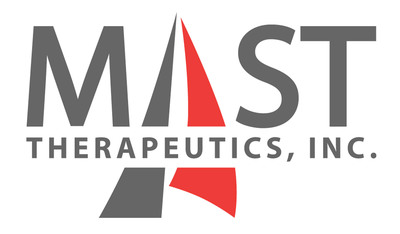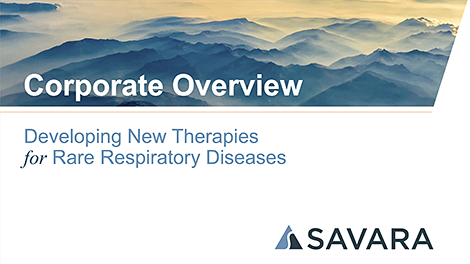SAN DIEGO, Sept. 28, 2015 /PRNewswire/ -- Mast Therapeutics, Inc. (NYSE MKT: MSTX), a clinical-stage biopharmaceutical company leveraging its molecular adhesion and sealant technology (MAST) platform to develop novel therapies for sickle cell disease, heart failure, and stroke, today announced that data from a nonclinical study of vepoloxamer, its lead product candidate, will be presented at the 19th Annual Scientific Meeting of the Heart Failure Society of America (HFSA). The oral presentation will be given by Dr. Hani N. Sabbah, Professor of Medicine and Director of Cardiovascular Research at Henry Ford Health System, at 12:15 p.m. ET today. The HFSA conference is being held at the Gaylord National Resort & Convention Center in National Harbor, Maryland, September 26 through September 29, 2015.
In the study, isolated failing cardiomyocytes from an animal model of chronic heart failure were treated in vitro for two hours with low or high-dose vepoloxamer or placebo control. Treatment with vepoloxamer was associated with a significant, dose-dependent reduction in intracellular calcium concentration compared to control. These results indicate that vepoloxamer, through its membrane-sealing activity, can limit unregulated calcium entry into failing cardiomyocytes in a dose-dependent manner, which may limit or prevent calcium overload.
Dr. Sabbah said: "Microscopic sarcolemmal membrane disruptions have been described in cardiomyocytes of the failing heart and are believed to be responsible for unregulated calcium entry into the cell, which contributes to calcium overload, a key abnormality responsible for ongoing cardiomyocyte dysfunction and death in heart failure. These results indicate that the membrane-sealing properties of vepoloxamer may help restore damaged cardiac cell membrane integrity, thus minimizing calcium overload injury, preserving cardiomyocytes, and directly improving LV contractile function."
Dr. R. Martin Emanuele, the Company's Senior Vice President, Development, said: "We believe the activity of vepoloxamer in preventing unregulated calcium entry into failing cardiomyocytes is unique, and may offer a new mechanistic approach for heart failure patients. Also, because of its unique mechanism, vepoloxamer should be additive to existing therapies. We look forward to further demonstrating vepoloxamer's potential through our Phase 2 clinical trial in chronic heart failure."
Presentation Information:
- An oral presentation entitled "In-Vitro Exposure of Isolated Failing Cardiomyocytes to Vepoloxamer (Purified Poloxamer 188) Limits Unregulated Calcium Entry into the Cell" will be given by Dr. Sabbah at 12:15 p.m. ET today, September 28, 2015, at the Gaylord National Resort & Convention Center, National Harbor, Maryland.
- A copy of the presentation slides will be available after 12:15 p.m. ET on the Company's website at: http://www.masttherapeutics.com/technology/publications/
Other Nonclinical Studies of Vepoloxamer in Heart Failure
The Company previously reported results from two randomized, placebo-controlled nonclinical studies of vepoloxamer in a model of chronic heart failure produced by intracoronary microembolizations. In the first study, a single, two-hour administration of vepoloxamer resulted in robust improvements in key parameters of heart function, including left ventricular (LV) end-systolic volume, ejection fraction, stroke volume and cardiac output, which persisted for one to two weeks. In the second study, vepoloxamer was administered at the start of the study and a repeat treatment was administered three weeks after the first. The study concluded after a total of six weeks. The second study not only reproduced the treatment effect of the first study, but also showed that retreatment with vepoloxamer at three weeks after the initial administration improved upon the effects observed after the first administration. The effects observed after the second administration persisted for at least three weeks, until the end of the six-week study. Notably, after the second administration, LV ejection fraction had not returned to baseline values by the end of the study, but was still improved by approximately 20% above baseline. Vepoloxamer had no statistically significant effect on heart rate or blood pressure compared to control.
About Mast Therapeutics
Mast Therapeutics, Inc. is a publicly traded biopharmaceutical company headquartered in San Diego, California. The Company is leveraging its MAST platform, derived from over two decades of clinical, nonclinical and manufacturing experience with purified and non-purified poloxamers, to develop vepoloxamer (also known as MST-188), its lead product candidate, for serious or life-threatening diseases and conditions typically characterized by impaired microvascular blood flow and damaged cell membranes. The Company is also developing AIR001, a sodium nitrite solution for inhalation via nebulizer, for the treatment of heart failure with preserved ejection fraction (HFpEF).
Vepoloxamer is an investigational new drug being tested in a pivotal Phase 3 study called EPIC for the treatment of vaso-occlusive crisis in patients with sickle cell disease. AIR001 is an investigational new drug being tested in multiple institution-sponsored Phase 2a studies in patients with HFpEF. More information can be found on the Company's web site at www.masttherapeutics.com. (Twitter: @MastThera)
Mast Therapeutics™ and the corporate logo are trademarks of Mast Therapeutics, Inc.
Forward Looking Statements
Mast Therapeutics cautions you that statements included in this press release that are not a description of historical facts are forward-looking statements that are based on the Company's current expectations and assumptions. Such forward-looking statements include, but are not limited to, statements relating to prospects for successful development of vepoloxamer as a treatment for heart failure patients and anticipated timing of achievement of development milestones, such as commencement of clinical studies. Among the factors that could cause or contribute to material differences between the Company's actual results and the expectations indicated by the forward-looking statements are risks and uncertainties that include, but are not limited to: the uncertainty of outcomes in ongoing and future studies of the Company's product candidates and the risk that its product candidates, including vepoloxamer, may not demonstrate adequate safety, efficacy or tolerability in one or more such studies, including EPIC; delays in the commencement or completion of clinical studies, including as a result of difficulties in obtaining regulatory agency agreement on clinical development plans or clinical study design, opening trial sites, enrolling study subjects, manufacturing sufficient quantities of clinical trial material, being subject to a "clinical hold," and/or suspension or termination of a clinical study, including due to patient safety concerns or lack of funding; the potential for additional nonclinical or clinical studies to be required prior to initiation of a planned clinical study; the risk that, even if planned clinical studies are successful, the FDA or other regulatory agencies may determine they are not sufficient to support a new drug application; the potential that, even if clinical studies of a product candidate in one indication are successful, clinical studies in another indication may not be successful; the Company's reliance on contract research organizations (CROs), contract manufacturing organizations (CMOs), and other third parties to assist in the conduct of important aspects of development of its product candidates, including clinical studies, manufacturing, and regulatory activities for its product candidates, and that such third parties may fail to perform as expected; the Company's ability to obtain additional funding on a timely basis or on acceptable terms, or at all; the potential for the Company to delay, reduce or discontinue current and/or planned development activities, including clinical studies, partner its product candidates at inopportune times or pursue less expensive but higher-risk and/or lower return development paths if it is unable to raise sufficient additional capital as needed; the risk that, even if the Company successfully develops a product candidate in one or more indications, it may not realize commercial success and may never achieve profitability; the risk that the Company is not able to adequately protect its intellectual property rights and prevent competitors from duplicating or developing equivalent versions of its product candidates or that the use or manufacture of its products or product candidates infringe the proprietary rights of others; and other risks and uncertainties more fully described in the Company's press releases and periodic filings with the Securities and Exchange Commission. The Company's public filings with the Securities and Exchange Commission are available at www.sec.gov.
You are cautioned not to place undue reliance on forward-looking statements, which speak only as of the date when made. Mast Therapeutics does not intend to revise or update any forward-looking statement set forth in this press release to reflect events or circumstances arising after the date hereof, except as may be required by law.
Logo - http://photos.prnewswire.com/prnh/20120612/LA22456LOGO-a
To view the original version on PR Newswire, visit:http://www.prnewswire.com/news-releases/mast-announces-presentation-of-results-of-nonclinical-study-of-vepoloxamer-in-chronic-heart-failure-at-the-hfsas-annual-scientific-meeting-300149017.html
SOURCE Mast Therapeutics
Ioana C. Hone (ir@mastthera.com), 858-552- 0866 Ext. 303



